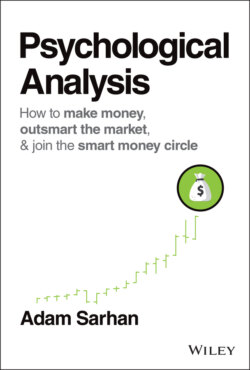Читать книгу Psychological Analysis - Adam Sarhan - Страница 34
SMART MONEY VERSUS DUMB MONEY
ОглавлениеIt became clear to me that Selden was right. Not only did I agree that psychology had a significant impact on the “movement of prices on exchanges,” I took it a step further and decided that human nature (specifically, my thoughts and behavior) is the most powerful force I could control—and the best part is human nature never changes.
Markets are counterintuitive in nature, and the main reason is that humans, all too often, are intellectually lazy and prefer immediate results, they want a shortcut, they want the easy way out, and they do not want to work. The smart money does the opposite. They focus on the goal: winning. They know the work needed to win is just an inevitable part of the process.
The dumb money loves drama; it loves being the hero of its own (usually dumb) story. Dumb money loves to play the victim card, find villains, and blame others for failure.
Smart money does the opposite on Wall Street; we play to win, take responsibility for our actions, measure our results, improve our game, and focus on the next win. The dumb money runs away from pain and is drawn to instant gratification and pleasure.
The dumb money chases shiny objects, is constantly tempted by greed, is crippled from fear, thrives on chaos, and clings to hope. It's always been this way. Human nature never changes.
Put simply, people in the smart money circle are in control of their psychology—their thoughts, their decisions, their actions, their money, and their life. The people in the dumb money circle are not.
Knowing that human nature never changes, and understanding that psychology affects the price for just about every freely traded market in the world, I began looking for evidence of human nature at play in stock charts. You see it when a price jumps on the promise of good news. It's there when institutional traders show up and support a stock that is falling. It's there when millions of traders jump to buy a hot new stock as it races impossibly upward, fueled by a fear of missing out or blind greed. You see it when the faint‐hearted abandon their positions the first time a stock falls a few points and they experience pain.
Unfortunately, human nature is difficult to quantify. It's difficult to predict with an algorithm—just ask Google, as they spend unimaginable fortunes to unravel the mystery. Instead, human nature has a more intangible quality. You know it when you experience or see it. In time, with experience, the intangible qualities become obvious when you know what to look for—in yourself and in others.
